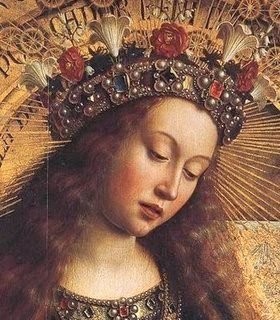
Jan van Eyck, from Ghent altarpiece
Spiritual Sunday
Today, as a member of my church choir, I participate in our service of Lessons and Carols (an indication that they will let anyone sing, especially if he is a guy). One of our featured songs is a lyric that I teach in my medieval literature survey.
“Adam Lay Bound” is a beautifully simple version of the fortunate fall argument (felix culpa). The reasoning is that, although Adam and Eve bounded us for 4000 years by bringing suffering and death into the world, it was worth it because, as a result, we are able to experience God’s grace and forgiveness. This poem is especially delighted that we are able to have Mary as our heavenly queen.
Milton gives us a version of fortunate fall reasoning in the final book of Paradise Lost when he shows Adam overwhelmed with admiration upon learning about Jesus’s future sacrifice on behalf of humankind. Adam says that the sacrifice is even more remarkable than God’s initial creation:
O goodness infinite, goodness immense!
That all this good of evil shall produce,
And evil turn to good; more wonderful
Than that which by creation first brought forth
Light out of darkness! Full of doubt I stand,
Whether I should repent me now of sin
By me done and occasioned, or rejoice
Much more, that much more good thereof shall spring,
To God more glory, more good will to men
From God, and over wrath grace shall abound.
So that is Milton in his grand baroque style. In some ways, however, I prefer the medieval version, which boils everything down to stealing an apple and singing praises to Mary. “Adam Lay Bound” is sweet simplicity:
Adam lay ybounden, bounded in a bond,
Four thousand winter thoughte he not too long;
And al was for an apple, an apple that he took,
As clerkes finden written, written in hire book.
Ne hadde [had not] the apple taken been, the apple taken been,
Ne hadde nevere Oure Lady ybeen hevene Queen.
Blessed be the time that apple taken was:
Therfore we mown singen Deo Gratias.
I have to say that the concept of the fortunate fall has always struck me, on one level, as Christian rationalizing. If all our suffering could have been averted by a different decision in the Garden of Eden, then I would dispense with the Queen of Heaven in a heartbeat. 4000 winter can’t be easily passed over just because there is a rainbow at the end. Then again, I do find it miraculous that, despite all our tribulations, we nevertheless manage to find our way to great joy. The joy may not compensate for human tragedy, but how amazing is it that Mary’s love enters our lives in the darkest of times. For that I sing, Deo Gratias. Thanks be to God.